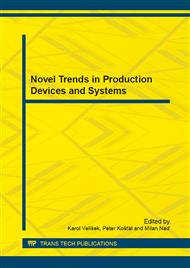p.399
p.405
p.411
p.417
p.423
p.430
p.436
p.442
p.448
Significance of Production Logistics in Integrated IT Systems
Abstract:
Production logistics is an element of the logistics system. This article presents its basic tasks and the scope of support for information technologists. The advance in the development of IT systems gives a new form to production enterprises supporting professional management of all logistics processes. Thanks to modern IT technology, production enterprises have the possibility of transformation, which enables them to carry out a new range of activities. The Author highlights in the paper the revolutionary role of integrated IT systems using the examples of selected systems, whose efficient implementation enables covering the operational needs of production enterprises. Although in the case of logistics, information has always constituted the basis for management, it is now when, thanks to the suitable technology, it has become the basis for competitive logistic strategies. Information, apart from workforce, capital, materials, is one of the basic resources of an enterprise, while IT systems have significantly extended the opportunity to make use of information which serves not only building reports or lists, but also covering operational needs of an enterprise. Thanks to those systems certain pieces of information can be used repeatedly without paying attention to their relevance. Proper implementation and use of integrated IT systems currently constitutes the basis for business management.
Info:
Periodical:
Pages:
423-429
DOI:
Citation:
Online since:
January 2014
Authors:
Price:
Сopyright:
© 2014 Trans Tech Publications Ltd. All Rights Reserved
Share:
Citation:


